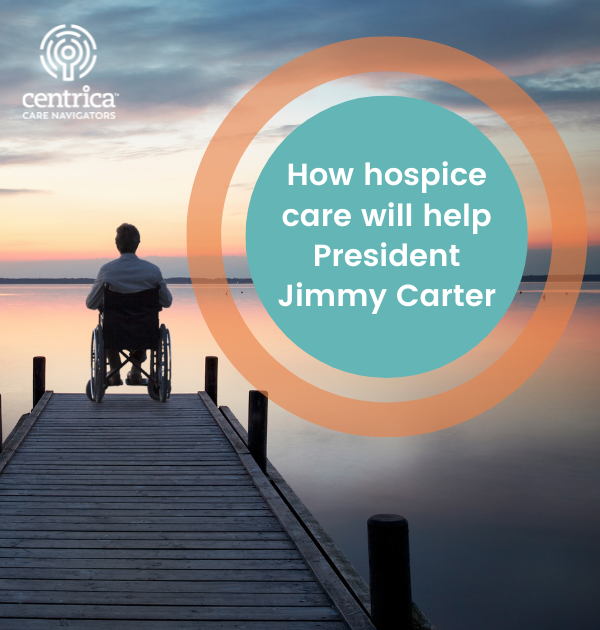On Saturday, February 18, former President Jimmy Carter entered home hospice care, according to his not-for-profit organization, The Carter Center. While news organizations highlighted his time as president and his work for human rights and democracy after leaving office, not much was noted about the kind of care he would be receiving.
The official statement says Carter “decided to spend his remaining time at home with his family and receive hospice care instead of additional medical intervention.” That’s the very definition of hospice care: concentrating on making the most of the time the patient has left, instead of trying to cure an illness.
Carter lives in Georgia, so he’s not a candidate for care by us here at Centrica Care Navigators (we serve 10 counties in southwest Michigan). But the care he is receiving is likely very similar to what our staff does.
The care team
The official statement says that Carter has the “full support of his family and his medical team.” The medical team, or interdisciplinary group (IDG) includes:
· A doctor specializing in hospice care, who talks with the patient’s personal physician and manages the patient’s end-of-life care.
· A registered nurse, who monitors the patient’s condition and helps keep family informed about what’s happening to their loved one during the death and dying process.
· A social worker, who can talk with the patent and caregivers about anything and everything they might need assistance with. It could be finding healthy, nutritious food, or transportation to and from doctor appointments, or maybe it’s just listening and being a friend in a complex and sometimes confusing time.
· A chaplain or other counselor: Jimmy Carter’s care team probably has a chaplain too, given his strong religious faith (he has taught Sunday School at his church for decades). Centrica Care Navigators chaplains sometimes read the Bible and pray with patients. Other times, they’re someone a patient, caregivers, and family members of the patient can find comfort in talking with, no matter what their spiritual beliefs are.
The Centrica Care Navigators care team includes a few other members, too, like hospice aides who can help with personal care, music therapists who keep patients active — hearing is the last sense to leave a person — and volunteers who typically provide companionship to patients.
Care at home
Carter will also be at home for his hospice care. Staying at home is beneficial for many patients. It can reduce the discomfort and stress that can come with time spent in a hospital room or long-term care facility. We provide care in the patient’s own home for the majority of our patients too.
For some, that isn’t an option, though, and patients need round-the-clock attention. We have two hospice sites for dedicated care for patients who require more of a focus on their pain management: Centrica Rose Arbor Place in Kalamazoo and Centrica Glenn Arbor Place in Battle Creek.
Jimmy Carter is 98 years old, and news organizations are reporting that he has made the move to hospice care after several recent hospital visits. The decision is typically made by a patient like Carter, his family, and his doctor discussing their options together. That happens before any patient enters hospice care; it’s important that everyone involved understands what hospice is and what it can offer a patient.
That’s often a real help for caregivers and family members: they may not be sure what hospice offers before they begin the process, but once they see it, they appreciate the compassionate care their loved one receives. More than once family members have said they wish they had started hospice earlier for their loved one because of the difference it made in how the patient was feeling every day.
Making a referral
Carter’s doctor may have made a referral to hospice for him, determining that was the best option for him at this point. But doctors aren’t the only ones who can make referrals; family members and even patients themselves can reach out to see what kind of care is best.
When someone chooses to start hospice here at Centrica Care Navigators, they contact our admissions team, which assesses the patient to make sure they will receive care appropriate for their condition, and works to make sure the patient gets services that will make them comfortable during their time in hospice.
The time that remains
In the announcement from The Carter Center, you might have noticed the phrase “his remaining time.” Jimmy Carter may be beginning hospice, but that doesn’t mean it’s time to print his obituary. Patients in hospice care can live for weeks, months, and even years past their admission date. We want patients to be with the people closest to them and enjoy things they love in the time they have left.
Like all presidents, Jimmy Carter has a Secret Service detail assigned to him. After the statement of his decision to begin hospice care was released, a Secret Service spokesman wrote a message on social media.
“Rest easy, Mr. President,” it said. “We will be forever by your side.”
That’s the way everyone here at Centrica Care Navigators feels about each one of our patients.
For more on the care you or a loved one will receive at Centrica Care Navigators, call 269.345.0273.




